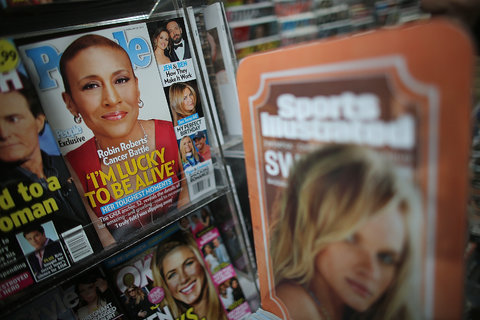Correction Appended
 Mario Tama/Getty Images Time Warner’s magazines include Sports Illustrated and People.
Mario Tama/Getty Images Time Warner’s magazines include Sports Illustrated and People.
9:14 p.m. | Updated What do you do with a group of celebrated magazines that no one seems to want?
Time Warner found its answer on Wednesday. It announced it would spin off its Time Inc. magazine unit into a separate, publicly traded company, a move that will allow the media conglomerate to focus entirely on its cable television and film businesses.
The announcement came hours after Time Warner and Meredith Corporation ended negotiations on a proposal that would have joined in a separate company many Time Inc. titles with magazines published by Meredith.
Laura Lang, the chief executive of Time Inc. who started the job just over a year ago, said she would depart once the spinoff of the magazine division was complete.
The deal with Meredith fell apart in part because of Time Warner’s concern over the fate of four of Time Inc.’s famous but struggling magazines — Time, Sports Illustrated, Fortune and Money, according to three people with knowledge of the negotiations who could not publicly discuss private conversations. At one point Meredith expressed some interest in the news and sports magazines, but Meredith decided not to pursue them because such a deal would have diluted its controlling family’s shares in the new company, another person with knowledge of the negotiations said. If Time Warner retained those four titles, the economics of a full spinoff proved more appealing, this person said.
Time Inc. is the nation’s largest magazine publisher, and the revelation last month that it was in talks to sell off many of its titles was viewed as another clear sign that the industry was buckling under intense financial pressures. The breakdown in talks threw into sharp relief how once-glamorous magazines like Time and Sports Illustrated have become troubled assets, with Time Warner wanting to shed them and Meredith not wanting them.
Time Inc., suffering from industrywide declines, has consistently lagged in Time Warner’s quarterly earnings. In the three months that ended Dec. 31, revenue at Time Inc. fell 7 percent to $967 million. In the same period, revenue at the company’s cable television channels, including TNT, TBS and HBO, grew 5 percent to $3.67 billion.
In a statement late Wednesday, Jeffrey L. Bewkes, chairman and chief executive of Time Warner, said a complete spinoff would provide clarity for the company as it concentrated on its high-growth businesses, primarily in cable television.
 Brian Snyder/Reuters Jeffrey L. Bewkes, chairman and chief executive of Time Warner, said a spinoff would provide clarity for the company.
Brian Snyder/Reuters Jeffrey L. Bewkes, chairman and chief executive of Time Warner, said a spinoff would provide clarity for the company.
“After a thorough review of options, we believe that a separation will better position both Time Warner and Time Inc.,” Mr. Bewkes said. “Time Inc. will also benefit from the flexibility and focus of being a stand-alone company,” he added.
Meredith’s prevailing interest in a deal had been to put together what would have essentially been a women’s magazine publisher. The new entity would have combined its National Media Group, which includes stalwarts like Ladies’ Home Journal and Better Homes and Gardens, with Time Inc.’s Lifestyle and Style Entertainment brands, which include People and InStyle.
Meredith executives had wavered in their interest in Time, Fortune, Money and Sports Illustrated, the people with knowledge of the negotiations said. Time Warner originally planned to keep them, citing news-gathering synergies with the company’s CNN channel, but that thinking changed. Time Warner executives walked away from the deal, believing they would be better off spinning off all of Time Inc.’s magazines without Meredith.
”We respect Time Warner’s decision and certainly remain open to continuing a dialogue on how our companies might work together,” said Stephen M. Lacy, Meredith’s chairman and chief executive.
The new company would have borrowed money to pay a one-time dividend of around $1.75 billion back to Time Warner.
Another sticking point in the negotiations was over which company would have ownership of Time Inc.’s London-based property, IPC Media, which publishes a mix of general-interest and upmarket titles like InStyle, Country Life and Decanter. IPC also includes an advertising business and a news trade and sales distribution company called Marketforce.
Founded by Edwin Thomas Meredith in 1902 with the publication of Successful Farming magazine, Meredith, based in Des Moines, Iowa, has always been a folksy, domestic company with strong Midwestern roots. Acquiring Time Inc.’s international business would have made for an odd pairing.
Time Inc. would be only the latest asset Time Warner has shed as it has evolved into a cable television and movie production company. Once a corporate giant, in recent years Time Warner has divested itself of AOL, Time Warner Cable, the Warner Music Group and the Time Warner Book Group.
Publishing divisions have been financial drags on other media companies as well. This summer, News Corporation is expected to complete a split of its publishing assets, including The Wall Street Journal, The New York Post and HarperCollins, into a separate, publicly traded company. The cable channels FX and Fox News and the 20th Century studios will remain in a company called Fox Group.
Ms. Lang, the former chief executive of Digitas, a digital advertising firm, took over at Time Inc. at a tumultuous time. The company had a nine-month leadership vacuum after the departure of its previous chief executive, Jack Griffin, a former Meredith executive who clashed with the culture of Time Inc.
Shortly after she was hired Ms. Lang brought on Bain Company, a Boston consulting firm, to help her turn the company around. She moved quickly to strike a deal that made all of its magazines available via Apple’s newsstand. But her efforts were not enough to stem the industrywide declines in subscription and advertising revenue.
Revenue at Time Inc. has declined by around 30 percent over the past five years. Last month, Time Inc. said it would lay off 6 percent of its 8,000 employees, which will cost Time Warner $60 million in restructuring.
Christine Haughney and Michael J. de la Merced contributed reporting.
Correction: March 7, 2013
An earlier version of this article misstated the name of Meredith’s founder. He was Edwin Thomas Meredith, not Edwin Thomas.
Article source: http://mediadecoder.blogs.nytimes.com/2013/03/06/fate-of-four-time-inc-magazines-are-an-issue-in-talks-with-meredith/?partner=rss&emc=rss